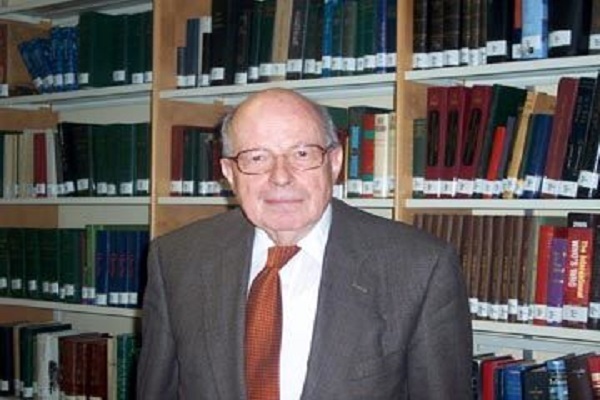AhlulBayt News Agency: Prominent Professor of Islamic studies Wilferd Madelung passed away on May 9, 2023.
Madelung was born on December 26, 1930, in Stuttgart, Germany. He completed his primary and secondary education there and then moved to Cairo University, where he earned his B.A. in Islamic History and Literature in 1953.
He pursued his higher education in Germany and obtained his PhD in Islamic Studies from University of Hamburg in 1957. His thesis was supervised by German Islamic scholars R. Strothmann and B. Spuler. He worked as a cultural attaché of West Germany in Baghdad for three years (1958 – 1960) and then devoted his academic life to Islamic Studies.
He has contributed greatly to the advancement of knowledge about Islamic thought and history, especially Shi'a, by writing and editing about 200 books and articles in research journals and encyclopedias and reviewing and introducing 160 books. His works cover a range of topics such as theology, history, fiqh, schools and sects, biographies and bibliographies. Some of his works have been translated into Persian.
One of his major works is “The Succession to Muhammad (s)”, which supports the Shia view of who should have succeeded the Holy Prophet (s). He has also introduced Shia to the Western world.
In his book, Madelung discusses the Quranic perspective on the prophet’s successorship. He argues that the Quran does not have a clear verse on this issue, but it has many recommendations to take care of the Prophet’s family and relatives.
He also examines how previous prophets chose their successors, usually from among their kin. He suggests that these verses imply that the Holy Prophet was worried about this matter and wanted to appoint someone from his family as his successor, but he died unexpectedly before he could do so.
“Religious Trends in Early Islamic Iran”, “Religious and Ethnic Movements in Medieval Islam”, “An Ismaili Heresiography”, “The Advent of the Fatimids: A Contemporary Shi'i Witness”, and “Religious School and Sects in Medieval Islam” are among his credits.
He was Associate Professor (1966–68) and then Professor of Islamic History from 1969 until 1978 at the University of Chicago before acting as Laudian Professor of Arabic at the University of Oxford from 1978 to 1998.
/129
10 May 2023 - 10:11
News ID: 1364444

Prominent Professor of Islamic studies Wilferd Madelung passed away on May 9, 2023.
